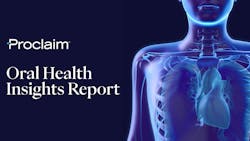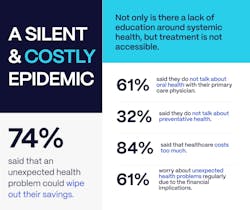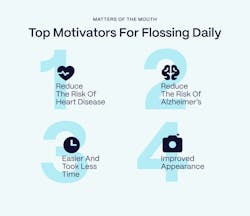New consumer data reveals PCPs don’t talk about oral care or preventive health with patients
Just when we thought things were looking up, the new 2024 Oral Health Insights Report from Proclaim reveals that communication between primary care physicians and their patients about the importance of oral health as it relates to overall well-being is sorely lacking.
“Overall, an alarming number of people say their primary care physician does not talk to them about oral health (61%) or preventive health (32%) on a regular basis. Consequently, [of the 2,000 people surveyed] many were not aware of the connection between poor oral health and heart disease (50%) and cognitive disorders such as dementia and Alzheimer’s (77%),” information from Proclaim states.
The report also reveals that many Americans worry about incurring future unforeseen medical costs, with 74% agreeing/strongly agreeing that an unexpected health problem could wipe out their savings. Sixty-one percent say they worry about these unforeseen health issues on a regular basis because of the financial implications. This underscores the urgent need for more education and a stronger preventive approach in health care to mitigate future financial and health crises.
Robert Eber, DDS, MS, said, “Sadly, many people aren’t aware that poor oral health can cause inflammation that allows untreated bacteria in the mouth to enter the bloodstream and travel throughout the body. Research shows a correlation between these bacteria and serious, debilitating systemic diseases and chronic illnesses impacting the heart, brain, and digestive system. A direct causal relationship has not yet been established, but it makes sense to eliminate bacterial-induced inflammation anywhere in the body, starting with the mouth, the gateway to the rest of the body.”
“This lack of communication and education between health-care providers and patients creates a huge knowledge gap that can lead to serious repercussions, potentially resulting in a large number of the population being diagnosed with preventable diseases,” said Proclaim CEO Herberto Calves, “Right now, our health-care system focuses so much effort on reactive treatment to medical issues rather than preventing them in the first place, and something has to change.”
What are patients doing at home?
The 2024 Oral Health Insights Report also reveals a gap between people’s beliefs about their flossing habits and their actual practices. While 88% say flossing is important, only 43% actually floss every day. Some (7%) said they never floss, or they only do so when they have something stuck in their teeth (10%). Even though a majority of people don’t floss daily, 31% say they would be less attracted to and less likely to date a partner because of their poor flossing habits.
Nearly a quarter (24%) of respondents admit to lying to their dentist about how often they floss, with men being 5% more likely to do so. The primary reason for this? Embarrassment (52%). But not to be deterred, 41% admit to lying to avoid receiving a lecture from their oral health provider.
As with so much in health care, solutions are easier said than done. People report that forming sustainable healthy habits at home can be challenging. In fact, 73% of people agree that even habits that are good for them can be hard to maintain and 53% said they find it hard to build new habits. But most (81%) also say that starting off their day with a quick habit, whether brushing their teeth or making their bed, actually makes them feel more productive the rest of the day.
A majority of respondents (68%) agree that habits that take less than 10 seconds a day are more attainable than ones that take longer. Thirty-seven percent even said they would be motivated to floss daily if it was easier and took less time.
“It’s clear people want easy, time-saving solutions that actually work, and Proclaim provides exactly that, helping people live healthier, longer lives in just seven seconds a day at the push of a button,” said Calves. He invites oral health-care professionals to visit proclaimhealth.com to learn more about the customized solutions they offer for home care in just seven seconds a day.
Methodology: Third-party online market research company Pollfish conducted a May 2024 survey of 2,000 US adults. Additional data sources include independent secondary research, sourced throughout this release as needed.
About the Author

Meg Kaiser
Associate Editor
Meg Kaiser is an associate editor in Endeavor Business Media’s Dental Division. She works on DentistryIQ.com, RDH eVillage and RDH Graduate newsletters, Dental Economics magazine, and RDH magazine, and has for nearly 20 years. She knew she'd caught the dental bug when she began preaching oral-systemic health to everyone she met. Contact her at [email protected].


